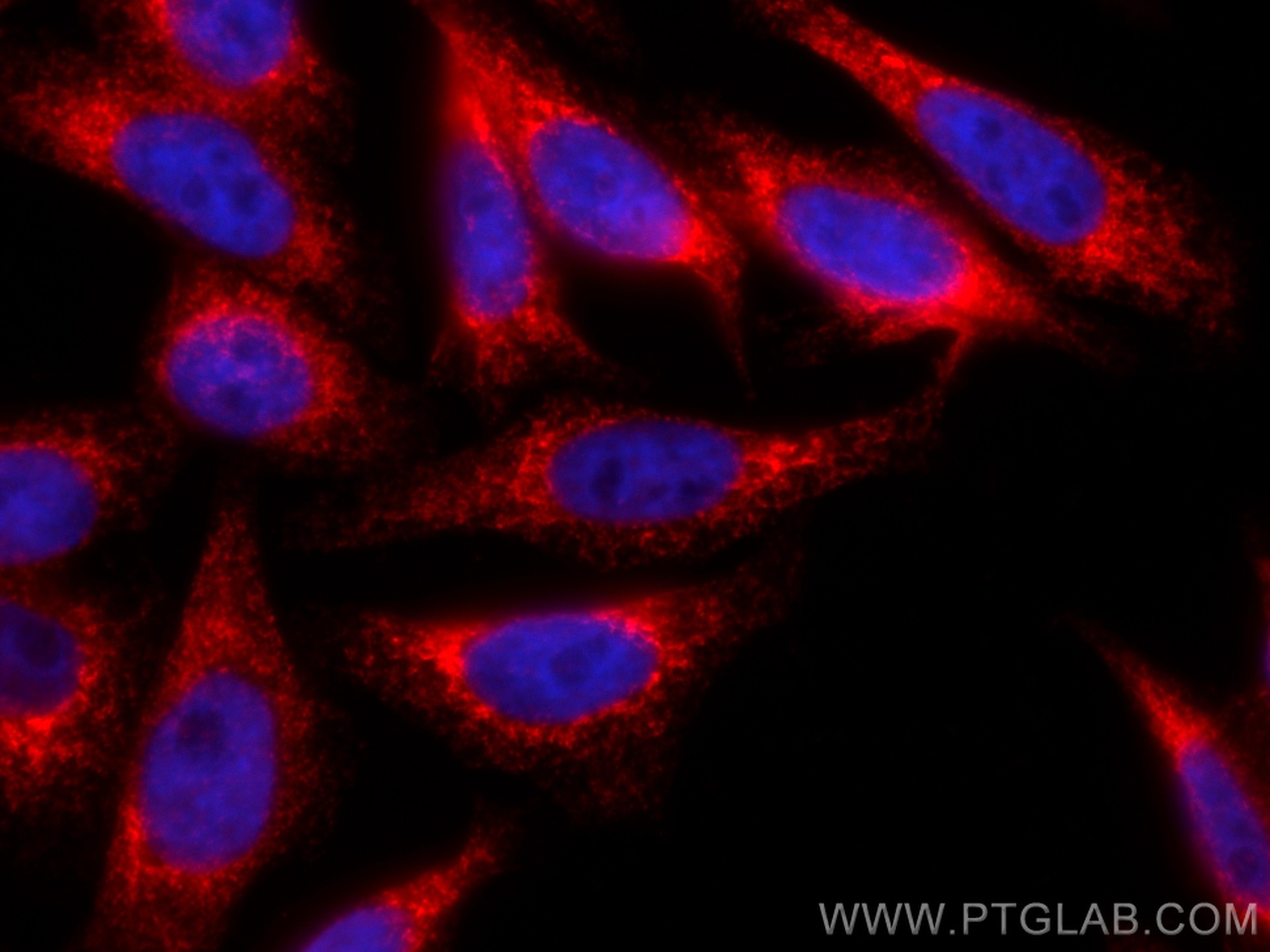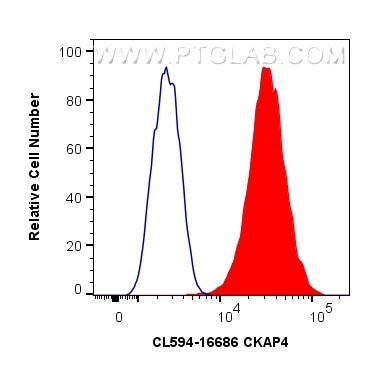Validation Data Gallery
Tested Applications
| Positive IF/ICC detected in | HepG2 cells |
| Positive FC (Intra) detected in | HeLa cells |
Recommended dilution
| Application | Dilution |
|---|---|
| Immunofluorescence (IF)/ICC | IF/ICC : 1:50-1:500 |
| Flow Cytometry (FC) (INTRA) | FC (INTRA) : 0.80 ug per 10^6 cells in a 100 µl suspension |
| It is recommended that this reagent should be titrated in each testing system to obtain optimal results. | |
| Sample-dependent, Check data in validation data gallery. | |
Published Applications
| IF | See 1 publications below |
Product Information
CL594-16686 targets CKAP4 in IF/ICC, FC (Intra) applications and shows reactivity with human, mouse, rat samples.
| Tested Reactivity | human, mouse, rat |
| Cited Reactivity | mouse |
| Host / Isotype | Rabbit / IgG |
| Class | Polyclonal |
| Type | Antibody |
| Immunogen |
CatNo: Ag10019 Product name: Recombinant human CKAP4 protein Source: e coli.-derived, PGEX-4T Tag: GST Domain: 254-602 aa of BC082972 Sequence: IFTEVQKRSQKEINDMKAKVASLEESEGNKQDLKALKEAVKEIQTSAKSREWDMEALRSTLQTMESDIYTEVRELVSLKQEQQAFKEAADTERLALQALTEKLLRSEESVSRLPEEIRRLEEELRQLKSDSHGPKEDGGFRHSEAFEALQQKSQGLDSRLQHVEDGVLSMQVASARQTESLESLLSKSQEHEQRLAALQGRLEGLGSSEADQDGLASTVRSLGETQLVLYGDVEELKRSVGELPSTVESLQKVQEQVHTLLSQDQAQAARLPPQDFLDRLSSLDNLKASVSQVEADLKMLRTAVDSLVAYSVKIETNENNLESAKGLLDDLRNDLDRLFVKVEKIHEKV 相同性解析による交差性が予測される生物種 |
| Full Name | cytoskeleton-associated protein 4 |
| Calculated molecular weight | 602 aa, 66 kDa |
| Observed molecular weight | 63 kDa |
| GenBank accession number | BC082972 |
| Gene Symbol | CKAP4 |
| Gene ID (NCBI) | 10970 |
| RRID | AB_2919837 |
| Conjugate | CoraLite®594 Fluorescent Dye |
| Excitation/Emission maxima wavelengths | 588 nm / 604 nm |
| Form | |
| Form | Liquid |
| Purification Method | Antigen affinity purification |
| UNIPROT ID | Q07065 |
| Storage Buffer | PBS with 50% glycerol, 0.05% Proclin300, 0.5% BSA{{ptg:BufferTemp}}7.3 |
| Storage Conditions | Store at -20°C. Avoid exposure to light. Stable for one year after shipment. Aliquoting is unnecessary for -20oC storage. |
Background Information
CKAP4, also named as Climp-63, is a 63 kDa cytoskeleton-linking membrane protein. It is the partner of triadin. CKAP4 is responsible for this association of triads and microtubules.
Protocols
| Product Specific Protocols | |
|---|---|
| FC protocol for CL594 CKAP4 antibody CL594-16686 | Download protocol |
| IF protocol for CL594 CKAP4 antibody CL594-16686 | Download protocol |
| Standard Protocols | |
|---|---|
| Click here to view our Standard Protocols |


